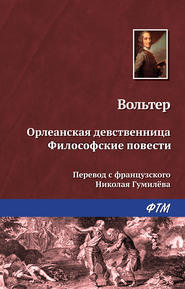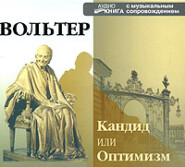По всем вопросам обращайтесь на: info@litportal.ru
(©) 2003-2024.
✖
A Philosophical Dictionary, Volume 09
Настройки чтения
Размер шрифта
Высота строк
Поля
The musical-instrument maker places, and shifts forward or backward, the soul of a violin, under the bridge, in the interior of the instrument: a sorry bit of wood more or less gives it or takes from it a harmonious soul.
We have several manufactures in which the workmen give the appellation of "soul" to their machines; but they are never heard to dispute about the word: it is otherwise with philosophers.
The word "soul," with us, signifies in general that which animates. Our predecessors, the Celts, gave their soul the name of "seel," of which the English have made soul, while the Germans retain "seel"; and it is probable that the ancient Teutons and the ancient Britons had no university quarrels about this expression.
The Greeks distinguished three sorts of souls: "Psyche," signifying the sensitive soul – the soul of the senses; and hence it was that Love, the son of Aphrodite, had so much passion for Psyche, and that she loved him so tenderly; "Pneuma," the breath which gave life and motion to the whole machine, and which we have rendered by "spiritus" – spirit – a vague term, which has received a thousand different acceptations: and lastly, "nous," intelligence.
Thus we possess three souls, without having the slightest notion of any one of them. St. Thomas Aquinas admits these three souls in his quality of peripatetic, and distinguishes each of the three into three parts.
"Psyche" was in the breast; "Pneuma" was spread throughout the body; and "Nous" was in the head. There was no other philosophy in our schools until the present day; and woe to the man who took one of these souls for another!
In this chaos of ideas, there was however a foundation. Men had clearly perceived that in their passions of love, anger, fear, etc., motions were excited within them; the heart and the liver were the seat of the passions. When thinking deeply, one feels a laboring in the organs of the head; "therefore, the intellectual soul is in the brain. Without respiration there is no vegetation, no life; therefore, the vegetative soul is in the breast, which receives the breath of the air."
When men had seen in their sleep their dead relatives or friends, they necessarily sought to discover what had appeared to them. It was not the body, which had been consumed on a pile or swallowed up in the sea and eaten by the fishes. However, they would declare it was something, for they had seen it; the dead man had spoken; the dreamer had questioned him. Was it "Psyche"; was it "Pneuma"; was it "Nous" with whom he had conversed in his sleep? Then a phantom was imagined – a slight figure; it was "skia" – it was "daimonos" – a shade of the manes; a small soul of air and fire, extremely slender, wandering none knew where.
In after times, when it was determined to sound the matter, the undisputed result was, that this soul was corporeal, and all antiquity had no other idea of it. At length came Plato, who so subtilized this soul, that it was doubted whether he did not entirely separate it from matter; but the problem was never resolved until faith came to enlighten us.
In vain do the materialists adduce the testimony of some fathers of the Church who do not express themselves with exactness. St. Irenæus says that the soul is but the breath of life, that it is incorporeal only in comparison with the mortal body, and that it retains the human figure in order that it may be recognized.
In vain does Tertullian express himself thus:
"The corporality of the soul shines forth in the Gospel. 'Corporalitas animæ in ipso evangelio relucesseit.'" For if the soul had not a body, the image of the soul would not have the image of the body.
In vain does he even relate the vision of a holy woman who had seen a very brilliant soul of the color of the air.
In vain does Tatian expressly say:
Ψυχὴ μὲν οὖν εἰ τῶν ἀνθρώπων πυλυμερής ἐστιν
– "The soul of man is composed of several parts."
In vain do they adduce St. Hilary, who said in later times: "There is nothing created which is not corporeal, neither in heaven nor on earth; neither visible nor invisible; all is formed of elements; and souls, whether they inhabit a body or are without a body, have always a corporeal substance."
In vain does St. Ambrose, in the fourth century, say: "We know nothing but what is material, excepting only the ever-venerable Trinity."
The whole body of the Church has decided that the soul is immaterial. These holy men had fallen into an error then universal; they were men: but they were not mistaken concerning immortality, because it is evidently announced in the Gospels.
So evident is our need of the decision of the infallible Church on these points of philosophy, that indeed we have not of ourselves any sufficient notion of what is called pure spirit, nor of what is called matter. Pure spirit is an expression which gives us no idea; and we are acquainted with matter only by a few phenomena. So little do we know of it, that we call it substance, which word "substance" means that which is beneath; but this beneath will eternally be concealed from us; this beneath is the Creator's secret, and this secret of the Creator is everywhere. We do not know how we receive life, how we give it, how we grow, how we digest, how we sleep, how we think, nor how we feel. The great difficulty is, to comprehend how a being, whatsoever it be, has thoughts.
SECTION II
Locke's Doubts concerning the Soul
The author of the article on "Soul," in the "Encyclopædia," who has scrupulously followed Jacquelot, teaches us nothing. He also rises up against Locke, because the modest Locke has said:
"Perhaps we shall never be capable of knowing whether a material being thinks or not; for this reason – that it is impossible for us to discover, by the contemplation of our own ideas, 'without revelation,' whether God has not given to some portion of matter, disposed as He thinks fit, the power of perceiving and thinking; or whether He has joined and united to matter so disposed, an immaterial and thinking substance. For with regard to our notions, it is no less easy for us to conceive that God can, if He pleases, add to an idea of matter the faculty of thinking, than to comprehend that He joins to it another substance with the faculty of thinking; since we know not in what thought consists, nor to what kind of substance this all-powerful Being has thought fit to grant this power, which could be created only by virtue of the good-will and pleasure of the Creator. I do not see that there is any contradiction in God – that thinking, eternal, and all-powerful Being – giving, if He wills it, certain degrees of feeling, perception, and thought, to certain portions of matter, created and insensible, which He joins together as he thinks fit."
This was speaking like a profound, religious, and modest man. It is known what contests he had to maintain concerning this opinion, which he appeared to have hazarded, but which was really no other than a consequence of the conviction he felt of the omnipotence of God, and the weakness of man. He did not say that matter thought; but he said that we do not know enough to demonstrate that it is impossible for God to add the gift of thought to the unknown being called "matter," after granting to it those of gravitation and of motion, which are equally incomprehensible.
Assuredly, Locke was not the only one who advanced this opinion; it was that of all the ancients – regarding the soul only as very subtile matter, they consequently affirmed that matter could feel and think.
Such was the opinion of Gassendi, as we find in his objections to Descartes. "It is true," says Gassendi, "that you know that you think; but you, who think, know not of what kind of substance you are. Thus, though the operation of thought is known to you, the principle of your essence is hidden from you, and you do not know what is the nature of that substance, one of the operations of which is to think. You resemble a blind man who, feeling the heat of the sun, and being informed that it is caused by the sun, should believe himself to have a clear and distinct idea of that luminary, because, if he were asked what the sun is, he could answer, that it is a thing which warms…"
The same Gassendi, in his "Philosophy of Epicurus," repeats several times that there is no mathematical evidence of the pure spirituality of the soul.
Descartes, in one of his letters to Elizabeth, princess palatine, says to her: "I confess, that by natural reason alone, we can form many conjectures about the soul, and conceive flattering hopes; but we can have no assurance." And here Descartes combats in his letters what he advances in his books – a too ordinary contradiction.
We have seen, too, that all the fathers in the first ages of the Church, while they believed the soul immortal, believed it to be material. They thought it as easy for God to preserve as to create. They said, God made it thinking, He will preserve it thinking.
Malebranche has clearly proved, that by ourselves we have no idea, and that objects are incapable of giving us any; whence he concludes that we see all things in God. This, in substance, is the same as making God the author of all our ideas; for wherewith should we see ourselves in Him, if we had not instruments for seeing? and these instruments are held and directed by him alone. This system is a labyrinth, of which one path would lead you to Spinozism, another to Stoicism, another to chaos.
When men have disputed well and long on matter and spirit, they always end in understanding neither one another nor themselves. No philosopher has ever been able to lift by his own strength the veil which nature has spread over the first principle of things. They dispute, while nature is acting.
SECTION III
On the Souls of Beasts, and on Some Empty Ideas
Before the strange system which supposes animals to be pure machines without any sensation, men had never imagined an immaterial soul in beasts; and no one had carried temerity so far as to say that an oyster has a spiritual soul. All the world peaceably agreed that beasts had received from God feeling, memory, ideas, but not a pure spirit. No one had abused the gift of reason so far as to say that nature has given to beasts the organs of feeling, in order that they may have no feeling. No one had said that they cry out when wounded, and fly when pursued, without experiencing either pain or fear.
God's omnipotence was not then denied: it was in His power to communicate to the organized matter of animals pleasure, pain, remembrance, the combination of some ideas; it was in His power to give to several of them, as the ape, the elephant, the hound, the talent of perfecting themselves in the arts which are taught them: not only was it in His power to endow almost all carnivorous animals with the talent of making war better in their experienced old age than in their confiding youth; not only was it in His power to do this, but He had done it, as the whole world could witness.
Pereira and Descartes maintained against the whole world that it was mistaken; that God had played the conjurer; that He had given to animals all the instruments of life and sensation, that they might have neither sensation or life properly so called. But some pretended philosophers, I know not whom, in order to answer Descartes' chimera, threw themselves into the opposite chimera very liberally, giving "pure spirit" to toads and insects. "In vitium ducit culpæ fuga."
Betwixt these two follies, the one depriving of feeling the organs of feeling, the other lodging pure spirit in a bug – a mean was imagined, viz., instinct. And what is "instinct"? Oh! it is a substantial form; it is a plastic form; it is a – I know not what – it is instinct. I will be of your opinion, so long as you apply to most things "I know not what"; so long as your philosophy shall begin and end with "I know not"; but when you "affirm," I shall say to you with Prior, in his poem on the vanity of the world:
Then vainly the philosopher avers
That reason guides our deeds, and instinct theirs.
How can we justly different causes frame,
When the effects entirely are the same?
Instinct and reason how can we divide?
'Tis the fool's ignorance, and the pedant's pride.
The author of the article on "Soul," in the "Encyclopædia," explains himself thus: "I represent to myself the soul of beasts as a substance immaterial and intelligent." But of what kind? It seems to me, that it must be an active principle having sensations, and only sensations… If we reflect on the nature of the souls of beasts, it does not of itself give us any grounds for believing that their spirituality will save them from annihilation.
I do not understand how you represent to yourself an immaterial substance. To represent a thing to yourself is to make to yourself an image of it; and hitherto no one has been able to paint the mind. I am willing to suppose that by the word "represent," the author means I "conceive"; for my part, I own that I do not conceive it. Still less do I conceive how a spiritual soul is annihilated, because I have no conception of creation or of nothing; because I never attended God's council; because I know nothing at all of the principle of things.
If I seek to prove that the soul is a real being, I am stopped, and told that it is a faculty. If I affirm that it is a faculty, and that I have that of thinking, I am answered, that I mistake; that God, the eternal master of all nature, does everything in me, directing all my actions, and all my thoughts; that if I produced my thoughts, I should know those which I should have the next minute; that I never know this; that I am but an automaton with sensations and ideas, necessarily dependent, and in the hands of the Supreme Being, infinitely more subject to Him than clay is to the potter.
I acknowledge then my ignorance; I acknowledge that four thousand volumes of metaphysics will not teach us what our soul is.
An orthodox philosopher said to a heterodox philosopher, "How can you have brought yourself to imagine that the soul is of its nature mortal, and that it is eternal only by the pure will of God?" "By my experience," says the other. "How! have you been dead then?" "Yes, very often: in my youth I had a fit of epilepsy; and I assure you, that I was perfectly dead for several hours: I had no sensation, nor even any recollection from the moment that I was seized. The same thing happens to me now almost every night. I never feel precisely the moment when I fall asleep, and my sleep is absolutely without dreams. I cannot imagine, but by conjectures, how long I have slept. I am dead regularly six hours in twenty-four, which is one-fourth of my life."
The orthodox then maintained against him that he always thought while he was asleep, without his knowing of it. The heterodox replied: "I believe, by revelation, that I shall think forever in the next world; but I assure you, that I seldom think in this."
The orthodox was not mistaken in affirming the immortality of the soul, since faith demonstrates that truth; but he might be mistaken in affirming that a sleeping man constantly thinks.
Locke frankly owned that he did not always think while he was asleep. Another philosopher has said: "Thought is peculiar to man, but it is not his essence."















